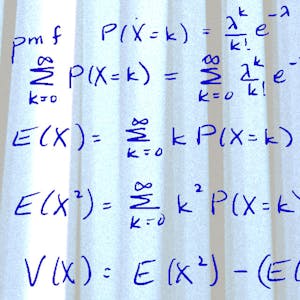This comprehensive course, "Statistical Inference for Estimation in Data Science," offered by the University of Colorado Boulder, delves into the intricate realm of statistical inference, sampling distributions, and confidence intervals.
Throughout the course, students will learn to identify and construct estimators, utilizing maximum likelihood and method of moments estimation techniques. They will also gain the expertise to construct and interpret confidence intervals for various population parameters, including means, proportions, and variances.
The course is structured as part of the Master of Science in Data Science (MS-DS) degree program, catering to individuals with diverse educational and professional backgrounds in computer science, information science, mathematics, and statistics.
By seamlessly blending theoretical concepts with practical applications, this course equips learners with the fundamental skills necessary to excel in the field of data science.
Certificate Available ✔
Get Started / More Info
This course comprises six modules that cover topics such as point estimation, maximum likelihood estimation, large sample properties of maximum likelihood estimators, confidence intervals involving the normal distribution, and non-normal confidence intervals, providing a comprehensive understanding of statistical inference and estimation in data science.
Welcome to the foundational module of the course, where students will get familiar with statistical inference, sampling distributions, and the techniques of maximum likelihood and method of moments estimation.
Delve into the realm of point estimation, exploring the characteristics of random variables, estimators, sampling distributions, and method of moments estimators, paving the way for constructing sound estimators.
Embark on a journey through maximum likelihood estimation, uncovering concepts such as MLEs, invariance, mean squared error, and sampling distributions, providing a deeper understanding of estimation techniques.
Explore the large sample properties of maximum likelihood estimators, including Fisher Information, the Cramer-Rao Lower Bound, the Weak Law of Large Numbers, and the Central Limit Theorem, enhancing knowledge of estimation in large samples.
Dive into confidence intervals involving the normal distribution, learning to construct and interpret confidence intervals for means, proportions, and variances, with a focus on the normal, t, and chi-squared distributions.
Unleash the power of non-normal confidence intervals, understanding how to construct confidence intervals for proportions, variances, and ratios of variances, expanding the horizons of confidence interval construction beyond normality.
This program provides a solid foundation in probability theory and statistical inference, essential for data science. It equips learners with the skills to perform...
ANOVA and Experimental Design introduces students to statistical modeling, ANOVA, ANCOVA, and experimental design, emphasizing real data applications and ethical...
Learn to forecast US Presidential Elections using mixed effects models in R, exploring voting trends and building a forecasting model for the 2020 election.
Introduction to Predictive Modeling provides an in-depth understanding of linear regression, time series forecasting, and data preparation in Excel, preparing learners...